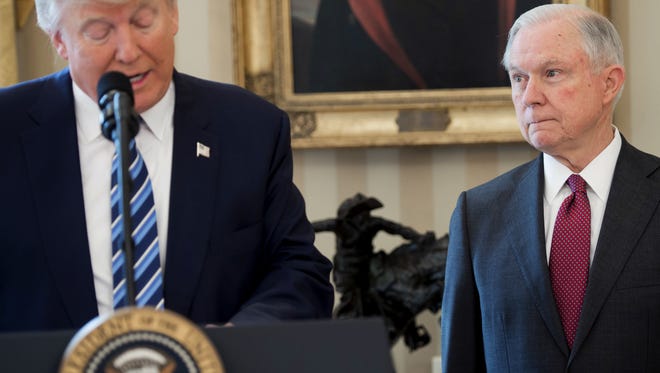Trump suggests the FBI director reports directly to the president. Here's how it really works
 Jessica Estepa
Jessica Estepa
President Trump suggested that the FBI director reports to the president in a wide-ranging and explosive interview with the New York Times on Wednesday.
"The FBI person really reports directly to the president of the United States, which is interesting," he told the Times.
It's a particularly illuminating line for a president who abruptly fired his FBI director, James Comey — especially since Comey subsequently accused Trump of demanding a pledge of personal loyalty, and pressing him to drop parts of the Russia investigation dogging his term.
The way Trump tells it, the FBI reports to the Justice Department as a courtesy, because of the Nixon administration. That isn't the case.
To explain this further, let's break this down.
The FBI doesn't report directly to the president, at least in the way he's implying.
By law, the president does nominate the FBI director, and that nomination is subject to Senate confirmation.
The president can also fire the FBI director, as Trump did in May. Comey himself noted that he serves at the pleasure of the president.
But the position of the FBI director reports to the attorney general. Also, the agency's intelligence activities are overseen by the Director of National Intelligence, according to the FBI.
FBI directors are expected to conduct politically independent investigations.
While it's true that the attorney general is part of Trump's Cabinet, the president's remarks that the FBI director answers directly to him ignores a longstanding precedent of distance between the executive branch and an independent FBI.
"As a matter of constitutional hierarchy, this is of course true. But in investigative matters, the FBI director does not, or should not, serve the president by reporting to him," wrote Benjamin Wittes, editor in chief of Lawfare blog and a senior fellow in governance studies at the Brookings Institution.
"He serves the president by leading law enforcement in an independent and apolitical fashion. And it is fundamentally corrupt for any president to be asking him to do otherwise... The astonishing implication of Trump’s view is that he believes the president may shut down an FBI investigation that displeases him."
FBI directors serve a lengthy 10-year term designed to guard FBI directors' political independence — and presidents typically do not want to give even the appearance of influencing the nonpolitical law enforcement agency's investigations.
For instance, while President Obama appointed Comey to head the agency, Comey said he only spoke with Obama twice in three years: once about law enforcement policy issues and once to say goodbye. By contrast, Comey said he and President Trump spoke nine times over the course of four months.
Related:
Trump's contacts with FBI Director James Comey break longstanding precedent
Trump's FBI director nominee Chris Wray: 'No one asked me for any kind of loyalty oath'
Warner: 'Unthinkable' if Trump pressured Comey to end FBI's investigation
Trump appeared to provide an alternative version of history in his Nixon reference.
"When Nixon came along... out of courtesy, the FBI started reporting to the Department of Justice," Trump said. "But there was nothing official, there was nothing from Congress."
But the FBI has reported to the Justice Department since its inception.
Here's a bit of history: The agency that would become the FBI was founded back in 1908, after Congress banned the loan of Secret Service operatives to other federal agencies. That forced Charles Bonaparte, attorney general under President Theodore Roosevelt, to create a force of investigators for the Justice Department.
He signed a memo that described a "regular force of special agents" that reported to the department's "Chief Examiner," according to the FBI.
Congress raised no objection, and when the next attorney general, George Wickersham, came to the department, he gave this group of agents a name: the Bureau of Investigation. It went through a couple of other name changes before it officially became the Federal Bureau of Investigation in 1935.
J. Edgar Hoover was the director of the Bureau of Investigation in 1924 and became the first director of the FBI in 1935. He was the FBI's director for 37 years, until he died in May 1972. One thing was constant throughout these changes: the FBI has always fallen under the Justice Department's jurisdiction.
Trump's reference of Nixon appears to miss the point entirely.
Even though they report to the attorney general, FBI directors have held enormous power throughout history. Hoover was so powerful that he often paid little heed to the attorney general, to whom he reported.
In 1969, Hoover would only authorize the FBI to start wiretaps on members of Nixon’s own administration and journalists if he had the written authorization of his direct superior at the time, Attorney General John Mitchell.
Now, all eyes are on Trump's new FBI director
Trump has nominated a new FBI director, Chris Wray — and his comments in the interview are already raising major questions about whether he considers Comey's replacement as a direct report.
Wray, for his part, has said no one has asked him for a loyalty pledge of any kind.
"My loyalty is to the constitution and the rule of law, full stop,'' Wray told the Senate Judiciary Committee last week.
The committee unanimously approved of Wray's nomination on Thursday, and a confirmation vote is expected soon.
Contributing: Ray Locker